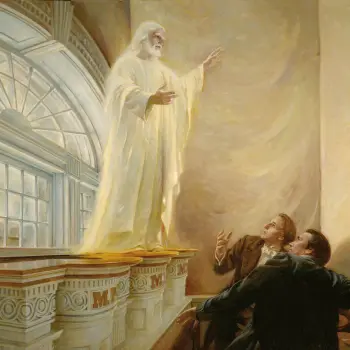Note: This article is published as a part of a symposium hosted by Patheos' Mormon Channel, entitled "The Mormon Moment."
Mormonism's participation in the 1893 World's Columbian Exposition, held in Chicago, served as a barometer of shifting American sentiments toward the faith. At the choral competition held on September 8, the Mormon Tabernacle Choir dazzled audience and judges alike, winning the silver medal. Greeted with rapturous acclaim, the choir had overnight become America's sweethearts. They were invited to provide patriotic music for the placement of the Liberty Bell at the Chicago Exposition. Their farewell concert was standing room only, journalists raved about the new singing sensation, and concert promoters lobbied the choir to tour the East.
Suddenly, Mormons were not just legitimate—they were popular. And then, a funny thing happened on the way to the festivities. In conjunction with the great Columbian Exposition, organizers had planned a World's Parliament of Religion for September 11-22, 1893, to "promote and deepen the spirit of human brotherhood among religious men of diverse faiths." Over three thousand invitations had been sent worldwide, to bring together representatives of every world faith and Christian denomination in a momentous gesture of interfaith respect and dialogue. Many faiths were underrepresented, but only one group was deliberately and conspicuously left out altogether. And that was, not unpredictably, the Mormons. So even while the choir was singing its way into history and America's heart, the church was emphatically denied a voice in the nation's first attempt at a comprehensive interfaith dialogue. What seemed like a contradiction was actually a compromise, as has become clear in subsequent years.
In the century since the Chicago fair, Mormons have been lauded for their many achievements. They are largely respected as good, decent, family-centered people, who are welcome to sing at presidential inaugurations (five times), provide a steady stream of recruits to the National Football League (Ty Detmer, Marc Wilson, and Steve Young, among others), as well as a basketball National Player of the Year (Jimmer Fredette), dance with the stars (Time lauded them as the "dancingest denomination"—fifty years before they dominated reality dance shows), and gave the world David Archuleta on American Idol. In exchange, everyone agreed to downplay the theological side of the church. Charles Dickens' words long guided public discourse on the religion: "What the Mormons do, seems to be excellent; what they say, is mostly nonsense."
Only by the end of the Romney campaign did we seem finally to be moving beyond discussion of magic underwear, Missouri Edens, and Kolob. Like the Amish, forever consigned to the purgatory of quaint horse and buggy caricatures, Mormons have been locked into pervasively packaged weirdness. With the effort to impose on candidates a religious test "by indirection" (Kennedy's 1960 phrase) now discredited in the course of a hard-fought campaign, perhaps Americans can at last begin a conversation about the substance, rather than the esoterica, of Mormon belief.
:::page break:::12/2/2022 9:09:21 PM




